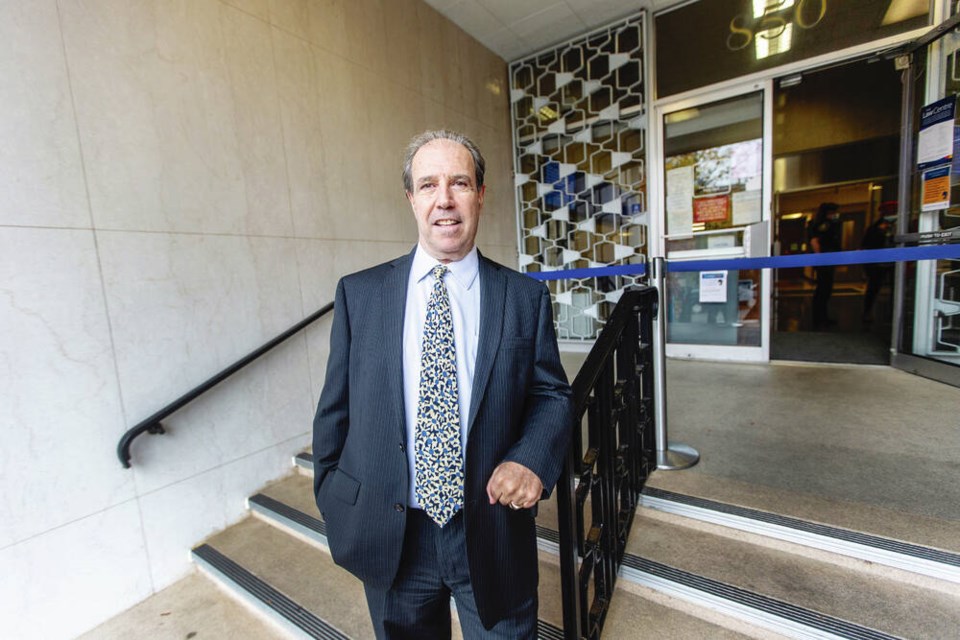The Law Society of B.C. is standing by its mandatory Indigenous coursework, denying it contains inaccuracies about residential school burial grounds, as alleged by a criminal defence lawyer who
In its March 10 response to a claim from Victoria-based lawyer James Heller, the society disputes allegations it was wrong to promote a statement found in coursework. The material had claimed 215 children’s bodies were definitively located in an unmarked burial site at the former Kamloops Indian Residential School, based on 2021 ground-penetrating radar findings from the Tk始emlúps te Secwépemc Nation.
Last September, Heller sought to have the society amend the language to state that was not the case and that the ground-penetrating radar discovery only showed anomalies, which could potentially be bodies, or not.
But when the society opposed Heller’s resolution at its annual general meeting, it also issued a press release that republished a link to a BC First Nations Justice Council online statement calling Heller’s resolution racist and a denial of Indigenous genocide.
“The resolution submitted by Mr. Heller … confirms much work remains to be done to … eliminate racism in our profession,” the society’s press release stated.
Heller claims the society defamed him by republishing the link to the BCFNJC’s allegations and suggesting he proposed a racist resolution.
The society, which regulates B.C. lawyers' conduct, stated its press release is fair comment and a matter of public interest.
Furthermore, the society stated it was “under a moral, legal and social duty to provide its members with other viewpoints on the resolution.”
The society stated it “does not call Heller a racist” and the press release “does not call any particular member of the profession a racist.”
In its 45-page response, the society also includes much of Heller’s text conversations with other members in the society’s resolution portal.
“These posts make it clear that Heller has very strong (although misinformed and misguided) views about what the facts and evidence are, and the conclusions to be drawn from them,” the society stated.
“It is clear, too, that Heller is willing to discount what has been said by various authorities and by survivors, and to minimize the findings of actual experts. He does this while preferring his own (inexpert) views on the issues.”
The society’s response went on to state that Heller’s attempt to insert the word “potential” ignores the expert evidence that it is “probable” there are unmarked graves.
And whereas Heller has stated he was merely wishing to ensure the coursework is accurate and does not deny harms of residential schools, the society claims that “Heller brought the resolution in a way that was improperly and inaccurately framed in circumstances in which he knew the issue was one of great tension and complexity.”
The society does acknowledge, however, “it is correct that no bodies have been ‘unearthed’ at the Kamloops school.”
In a March 17 reply to the society’s response, Heller stated the society’s response contains “an impermissible degree of argument intended to malign the plaintiff and to advance political or social justice issues perspectives.”
The society’s effort to distinguish the words “potential” and “probable” was immaterial, argued Heller.
Heller stated that the BCFNJC statement “was the only outside viewpoint which the defendant republished.”
Heller also argued that the society’s supposed duty does not include publishing “defamatory imputations.”
Both the claim and responses rely on interpretations of a 2024 court case cited as R v. Dick.
In the Dick case, an Indigenous person was convicted of a crime but sought an appeal because the trial judge qualified the alleged unmarked graves as “potential” unmarked graves during the course of discussion in the courtroom.
The appeal application was brought forward on grounds the judge was biased. That was denied by a panel of three Court of Appeal judges, including Chief Justice Leonard Marchand, who is the first Indigenous person to hold that position.
“It is simply not possible to objectively interpret the judge’s comment about 'potential' remains at unmarked burial sites as indicative of apparent or actual intolerance, denial or bias,” Marchand ruled.
Heller’s claim suggests this is proof positive that his resolution to insert the word “potential” into the coursework is not racist, as it aligns with Justice Marchand’s own assessment.
The lawsuit has yet to proceed to trial and all of Heller’s allegations are unproven.




